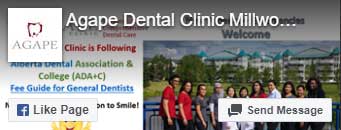
When you walk through the pharmacy or drugstore, you’ve most likely seen the aisle stocked with different dental products like toothbrushes, toothpaste, floss, and mouthwash. If you’re shopping for mouthwash in particular, it can be easy to feel overwhelmed — which option is best? Should you even use mouthwash?
Dentists often recommend incorporating mouthwash into your daily routine because of the health advantages it offers. If you have questions or are seeking additional tips about dental hygiene in Millwoods, please visit us here at Agape Dental Clinic. Our dentist near you is happy to discuss all your needs.
What Exactly is Mouthwash?
Mouthwash, or mouth rinse, is a unique product that’s meant to be swished around your mouth and then spit out. It’s important to know that using this is not a replacement for brushing and flossing. Rather it can be a helpful addition to your routine.
There are two main types of mouthwash: cosmetic and therapeutic. Cosmetic mouthwash helps freshen your breath but doesn’t actively fight bacteria. Therapeutic mouthwash contains certain ingredients that target bacteria, plaque, and tartar, helping users avoid a variety of issues like cavities, sensitivity, and gingivitis. Depending on your oral health, your dentist can help you identify the best type for you.
Benefits of Using Mouthwash
Mouthwash is advantageous in multiple ways, especially when it’s used consistently. These include the following:
- Fresher Breath
This is one of the main reasons why people buy and use mouthwash. It helps reduce bacteria that cause odours for a limited period. However, it’s good to keep in mind that if you’re suffering from chronic bad breath, mouthwash may not be the most suitable option, as this could be a symptom of a deeper dental problem.
- Fights Bacteria and Plaque
Antibacterial or antiseptic mouthwash is advised to help eliminate bacteria buildup that can contribute to the development of plaque and tartar. If you have difficulty reaching certain places in your mouth, like your molars, or cleaning between your teeth, this is a good way to ensure those spaces get extra attention.
- Strengthens Teeth with Fluoride
If your mouthwash has fluoride in it, this is a great way to prevent cavities. Fluoride encourages teeth to reabsorb healthy minerals like phosphate and calcium, which strengthen the enamel and dentin. Fluoride mouthwash, like toothpaste, and professional fluoride treatment, is a great option for patients who are more likely to develop cavities.
- Soothes Sensitive Gums
Certain mouthwash formulas are designed to reduce oral inflammation and bleeding gums. This type of mouthwash is worth exploring or discussing with your dentist in Millwoods since these signs can be a precursor to early gum disease.
- Extra Protection After Dental Procedures
If you’ve just undergone a tooth extraction, a deep cleaning, or acquired a dental implant, your dentists may advise using a specific type of mouthwash as a means of aftercare. These mouthwashes help you avoid infection and aid in healing.
When Mouthwash Might Be Helpful
Alongside the benefits outlined above, there are other reasons why you may want to consider acquiring mouthwash:
- You’re more prone to/have a history of cavities
- You wear braces, have a dental bridge, or have gotten other appliances that make flossing tricky.
- You want an extra measure of protection, especially during cold or flu season.
Choosing the Right Mouthwash
Depending on your dental health, there are several options available. Here is a breakdown:
| Type of Mouthwash | Best For |
|---|---|
| Alcohol-Free | Gentler on sensitive mouths and those with dry mouths or oral irritation. |
| Fluoride | Helps prevent tooth decay and keeps enamel health. |
| Antiseptic | Typically contains chlorhexidine or essential oils, ingredients which target unhealthy bacteria. |
| Prescription | Dentists may give you a medicated mouthwash to help your mouth heal after surgery or if you’re dealing with advanced gum disease. |
Note: Always be sure to check for the CDA Seal of Acceptance. This means the product has been proven safe and effective for consumer use.
How to Use Mouthwash Correctly
If you do decide to use mouthwash, it’s crucial to use it correctly; this will help you acquire optimal results:
- Read the Labels –Adhere to the instructions on the bottle. It will tell you how much to use and how long to swish for.
- Use After Brushing –Since it’s a supplementary step, mouthwash should be used after brushing and flossing.
- Don’t Eat or Drink After –Give the mouthwash time to work. Avoid eating or drinking water for 30 minutes afterward.
- Use Once or Twice a Day –Depending on the type of mouthwash and your individual needs, rinse with mouthwash at least once or twice a day.
So … Is Mouthwash Right for Me?
While mouthwash isn’t a necessity for everyone, it is a wonderful addition to help you maintain good oral health.
If you’re still unsure about it, don’t hesitate to talk to one of our knowledgeable, friendly dentists right here at Agape Dental Clinic. Every member of our team is here to help you experience lasting dental health and a functional, beautiful smile.
Book a dental hygiene consultation appointment near you! You can reach us via phone or drop by our location in person. We promise your mouth will thank you!

